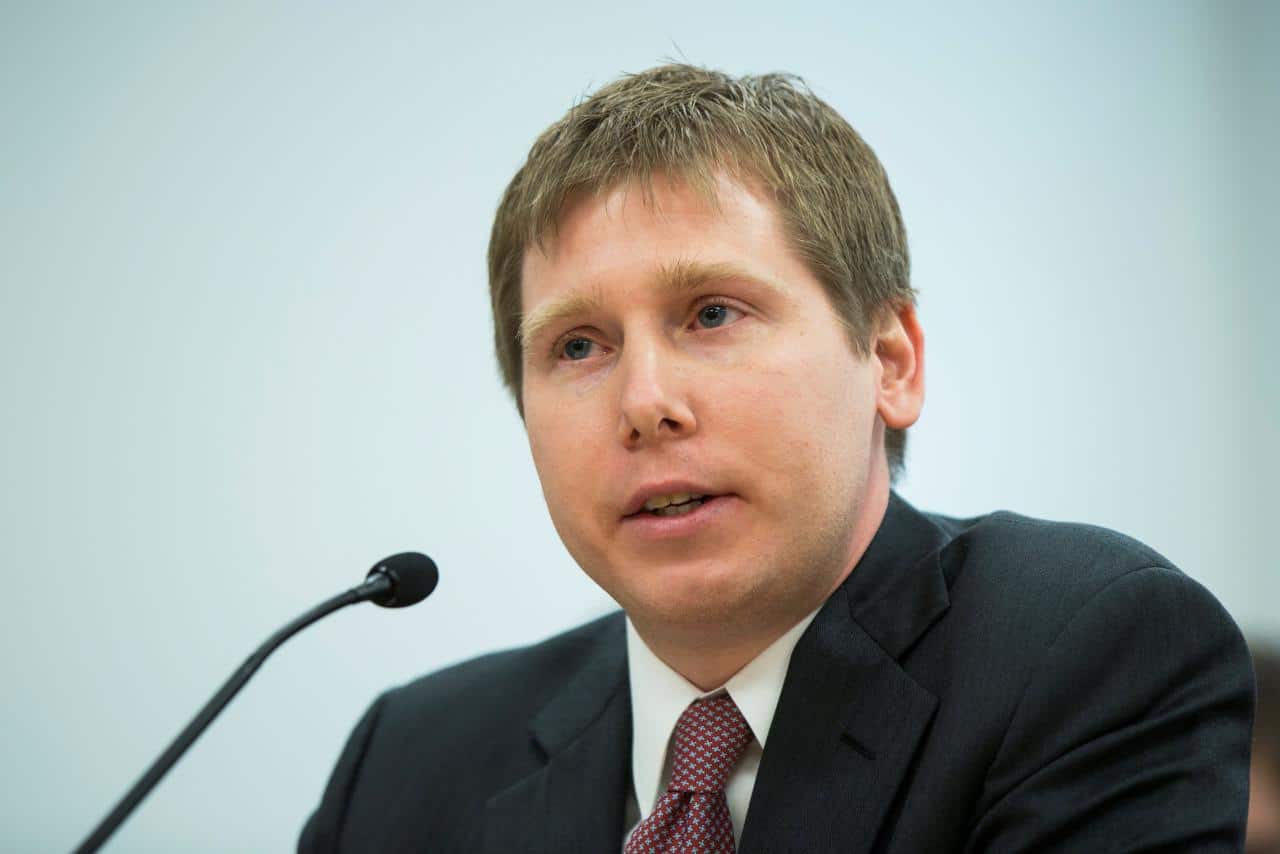HONG KONG/NEW YORK/LONDON (Reuters)
Seventeen months ago, a former Wall Street investment banker who specialized in distressed assets took to Twitter to announce he had bought a cryptocurrency for 50 cents per coin. “At $0.50, risk/return felt right,” tweeted Barry Silbert, founder and chief executive of a private New York-based company called Digital Currency Group, or DCG.

It has turned out to be a great bet. The digital coin – ethereum classic – was trading this week at as much as $47 – more than 90 times higher – before falling back. That’s an even bigger rise than that of bitcoin, a far better known cryptocurrency, over the same period. (Graphic: Ethereumclassic’s rapid rise – tmsnrt.rs/2BmQKBG) Silbert continues to be a big backer. In April, a DCG subsidiary launched a private investment fund that tracks ethereum classic’s price and donates part of its fees to developing the technology behind the currency. He still posts bullish comments about the digital coin on social media, including a “pro tip” last month advising an investor to “close out” his short position before an “Ethereum Classic Summit” organized by DCG was held in Hong Kong. (Read the Crypto Casino series – here)

On Dec. 12, Silbert tweeted that three cryptocurrency funds the DCG subsidiary offers now had more than $3 billion of assets under management – up from $164 million at the start of the year. Silbert’s cheerleading for ethereum classic and other digital coins he or his company own has led some critics on Twitter to nickname him “Barry Shillbert.” Silbert declined to comment on that barb. The story of Silbert and his role in ethereum classic’s rise illustrates the current hype over cryptocurrencies – strings of computer code that aren’t backed by governments, face little regulation and have become magnets for speculators.

Social media platforms are now filled with predictions by cryptocurrency enthusiasts about the price of bitcoin and other digital coins, many of which have soared in value this year. But two securities lawyers told Reuters they believed that some of Silbert’s social media postings about the price of ethereum classic could draw the attention of U.S. regulators. Although the digital coins are not considered securities, Silbert is chief executive of Grayscale, a DCG subsidiary that offers an ethereum-classic investment fund whose shares are securities, according to Grayscale’s website.

The attorneys said his postings on price and the “pro tip” he gave to one investor could raise red flags with regulators who enforce federal securities and commodities laws and rules that prohibit price manipulation. A spokeswoman for the U.S. Securities and Exchange Commission declined to comment on Silbert. In an interview with Reuters last month, Silbert said he was “highly, highly sensitive” to the rules that govern financial markets and that he and his company are “subject to anti-fraud provisions and insider trading and … all those types of things.” “I would never make a recommendation,” he said. “I’ve never given price predictions.” Silbert later told Reuters that DCG, its subsidiaries and employees “take pride in our strict compliance policies and adherence to all applicable regulations, including company-wide rules and restrictions concerning the trading of digital assets.” Regulators are grappling with how to deal with a new category of investment that this year has spurred billions of dollars worth of daily trades and seized Wall Street’s imagination. This month, two major derivatives exchanges began offering bitcoin futures contracts. But the mania for cryptocurrencies is outpacing regulators’ ability to keep up.

“SO FAR, SO GOOD”
Outside cryptocurrency circles, the boyish-looking Silbert, 41, is hardly a household name. He aims to change that. He told Reuters he aspires to build DCG into a publicly traded conglomerate like Berkshire Hathaway Inc, run by legendary investor Warren Buffett. After beginning his financial career at an investment bank, Silbert set up a marketplace for difficult-to-trade assets called SecondMarket, which he sold to a subsidiary of Nasdaq in 2015 for an undisclosed sum. He launched DCG that same year, devoting it to bitcoin and its underlying technology known as blockchain – a shared public database maintained by a network of computers. The company is backed by large corporations, including MasterCard, Western Union and Bain Capital Ventures. Silbert was an early buyer of bitcoin. He said he made his first purchase in 2012, and bought about $175,000 worth, paying about $11 for each digital coin. He said he was initially a skeptic but came to believe it could provide a better way to transmit funds around the world. “I started buying bitcoin, you know, at probably around seven bucks and my average price of bitcoin was $11. So when it went from 11 to 13, I thought I was a genius. When it fell to 8, I thought I was not,” he said. “But so far, so good.” At one point this week, a single bitcoin was trading for more than $19,600. Silbert said he contributed most of his bitcoin holdings to DCG, which still holds “a significant amount” of his original digital coins. He said DCG now has investments in more than 100 companies in 30 countries, including 20 cryptocurrency trading exchanges. Besides the asset-management business Grayscale, DCG’s subsidiaries include a cryptocurrency broker-dealer and CoinDesk, a leading cryptocurrency news website that reports on the industry and holds conferences.

“GREAT TIP”
Silbert decided to invest in ethereum classic, he said, in part because he believed it was undervalued. On July 25, 2016, he announced on Twitter that he had bought the virtual currency. He has been enthusing about it ever since. Reuters reviewed more than 200 of Silbert’s tweets and retweets about the virtual coin in the past 17 months that were captured by ExportTweet, a Twitter analytics service. On the same day Silbert announced on Twitter that he had bought ethereum classic, he made a prediction: there was a “25% chance” ethereum classic’s value would increase fivefold “in next six months.” In April, Silbert’s involvement with ethereum classic expanded into the more tangible world of securities. That month, his company launched the Ethereum Classic Investment Trust, which Silbert told Reuters was seeded by $10 million from him, DCG and a DCG board member. Grayscale’s website says the fund’s “shares are the first securities solely invested in and deriving value from the price of” ethereum classic. It says the private investment vehicle isn’t registered with the SEC, in accordance with a regulatory exemption. The SEC has allowed the sale of such offerings, which are still subject to federal securities laws. Grayscale manages three such funds, each investing in a different cryptocurrency: ethereum classic, bitcoin and Zcash. The funds offer an alternative for investors seeking to gain exposure to digital currencies without actually holding them. The Ethereum Classic Investment Trust is open only to so-called “accredited investors” with more than $200,000 of annual income or a net worth that exceeds $1 million. Earlier this week, Grayscale’s website said its shares had soared more than 800 percent in value since its inception. The fund’s holdings this month surpassed $140 million at one point. Silbert declined to say how much ethereum classic he personally owns. Silbert recently began using another messaging platform, called Discord, that is popular with cryptocurrency enthusiasts. In a series of messages on Discord on Nov. 7, Silbert texted a user who goes by the handle “Sinz” and asked if he would be attending an ethereum classic “summit” DCG was going to host in Hong Kong the following week. ”Sinz“ replied that he had to attend a family funeral. Silbert responded: ”oh man, sorry to hear my friend”. pro tip: close out your ETC short before the Summit…”

In a short position, an investor is betting the price will go down; Silbert appeared to be suggesting that ethereum classic’s price might soon rise. Another poster wrote in response on Discord: “Great tip” Sinz later said he ignored Silbert’s advice. Reuters could not determine whether the other poster or anyone else took any action. Ethereum classic was trading at about $14 on Nov. 7, the day Silbert gave the “pro tip,” according to CoinMarketCap.com, a website that provides cryptocurrency prices and other market data. The two-day “summit” was scheduled to begin in Hong Kong on Monday, Nov. 13, and the digital coin surged during the weekend before, surpassing $20 on Nov. 12. Daily trading volume that day reached a record $1 billion. Shares of Grayscale’s Ethereum Classic Investment Trust also rose before the Hong Kong conference. “We have a lot of financial accomplishments over the last 24 hours,” Meltem Demirors, DCG’s director of development, said on stage during the conference’s opening day on Nov. 13. “We had over one billion dollars of ETC traded for the first time ever. Wooo! Are we excited?” The audience clapped. “That’s pretty phenomenal,” she said. DCG’s Grayscale subsidiary put out a press release on Nov. 12 that it had begun the process to list shares of the Ethereum Classic Investment Trust on an over-the-counter trading venue. The shares rose to $16.97 on Nov. 14 from $14.29 on Nov. 10, according to Grayscale’s website. Reuters could not determine if the announcement affected the share price. On Nov. 29, Silbert tweeted that he had been invited to appear that week on the CNBC business television show Squawk Box. “Looking forward to dropping some Ethereum Classic and Zcash knowledge this time around…,” he wrote, referencing two cryptocurrencies tracked by Grayscale investment funds. On the show, Silbert was asked about the price of bitcoin. In responding, he said he currently liked two other cryptocurrencies: “Ethereum classic and Zcash … You’ve got to move into the other digital assets.”

GREY AREA
Reuters asked several securities lawyers to review Silbert’s postings about ethereum classic on social media. “It is risky,” said Trace Schmeltz, a partner at the Barnes & Thornburg law firm. “I think if I were advising Mr. Silbert, I would suggest that he is better off as a cryptocurrency expert at large rather than making specific comments on one particular cryptocurrency in which he has a heavy concentration of holdings.” Referring to Silbert’s message to the investor who was shorting ethereum classic, Schmeltz added: “If you have a fund that is issuing a security and the value of the security rises and falls with the price of a cryptocurrency and you are telling people to close their shorts in that cryptocurrency, that is a problem.” He warned it could be “market manipulation.” On its website, the SEC defines manipulation as “intentional conduct designed to deceive investors by controlling or artificially affecting the market for a security.” Robert Long, a former senior attorney with the Securities and Exchange Commission who is now a partner with the Dallas law firm Bell Nunnally, noted that the U.S. Commodity Futures Trading Commission (CFTC) views virtual currencies as commodities and can “police the virtual currency markets for manipulation and other misconduct.” Long, who is also a former federal prosecutor, said the commission “could take an interest given the nature and timing of some of the statements.” Silbert said he and DCG take pride in adhering to all applicable regulations. The SEC and CFTC declined to comment. Silbert has also tweeted about DCG’s investments in cryptocurrency exchanges, which are used to buy, sell and store digital coins. Getting an exchange to list a cryptocurrency is considered a coup and can spark a price rise because a listing makes the currency easier to trade. One of the companies DCG holds a stake in is BTCC, a Cayman Islands-registered cryptocurrency exchange company run by an American executive, Bobby Lee. On Nov. 3, 2016, Silbert tweeted: “BTCC exchange hints it is planning to add Ethereum Classic.” BTCC eventually launched a digital currency exchange called BTCC DAX in June 2017, with a single trading pair: ethereum classic and bitcoin. In an interview, a BTCC spokesman attributed the decision to list ethereum classic to the coin’s popularity. He said that was measured by “market cap, how much trading volume the coin has, and whether or not our customers have demanded it.” Lee conducted a poll on Twitter in May to determine which digital currencies BTCC should list. He later announced that ethereum classic had finished first. BTCC did not reply to questions about the size of DCG’s investment or whether that investment played a role in the decision to list ethereum classic. Silbert told Reuters that the exchange’s decision was based on its Twitter poll and that he had no advance knowledge of it.

